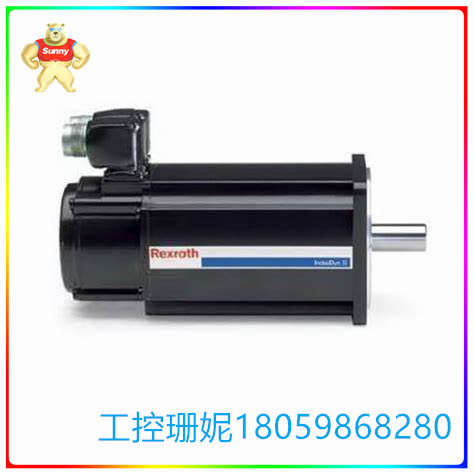☆型号:MSK040C-0600-NN-M2-UG0-NNNN 伺服电机 带轴密封圈的平轴

【产品详情】
Rexroth, Indramat, Bosch 的 MSK040C-0600-NN-S1-UG1-NNNN 是 MSK 系列中一款功能强大的电机。MSK040C-0600-NN-S1-UG1-NNNN 具有 600 的绕组代码和单圈 hiperface 光学编码器,增量为 128。该伺服电机具有自然对流的冷却模式和带轴密封圈的平轴(标准)。
伺服电机工作原理:
1、伺服系统(servo mechanism)是使物体的位置、方位、状态等输出被控量能够跟随输入目标(或给定值)的任意变化的自动控制系统。伺服主要靠脉冲来定位,基本上可以这样理解,伺服电机接收到1个脉冲,就会旋转1个脉冲对应的角度,从而实现位移,因为,伺服电机本身具备发出脉冲的功能,所以伺服电机每旋转一个角度,都会发出对应数量的脉冲,这样,和伺服电机接受的脉冲形成了呼应,或者叫闭环,如此一来,系统就会知道发了多少脉冲给伺服电机,同时又收了多少脉冲回来,这样,就能够很精确的控制电机的转动,从而实现精确的定位,可以达到0.001mm。直流伺服电机分为有刷和无刷电机。有刷电机成本低,结构简单,启动转矩大,调速范围宽,控制容易,需要维护,但维护不方便(换碳刷),产生电磁干扰,对环境有要求。因此它可以用于对成本敏感的普通工业和民用场合。
无刷电机体积小,重量轻,出力大,响应快,速度高,惯量小,转动平滑,力矩稳定。控制复杂,容易实现智能化,其电子换相方式灵活,可以方波换相或正弦波换相。电机免维护,效率很高,运行温度低,电磁辐射很小,长寿命,可用于各种环境。
2、交流伺服电机也是无刷电机,分为同步和异步电机,目前运动控制中一般都用同步电机,它的功率范围大,可以做到很大的功率。大惯量,最高转动速度低,且随着功率增大而快速降低。因而适合做低速平稳运行的应用。
3、伺服电机内部的转子是永磁铁,驱动器控制的U/V/W三相电形成电磁场,转子在此磁场的作用下转动,同时电机自带的编码器反馈信号给驱动器,驱动器根据反馈值与目标值进行比较,调整转子转动的角度。伺服电机的精度决定于编码器的精度(线数)。
交流伺服电机和无刷直流伺服电机在功能上的区别:交流伺服要好一些,因为是正弦波控制,转矩脉动小。直流伺服是梯形波。但直流伺服比较简单,便宜。
伺服电机(servo motor )是指在伺服系统中控制机械元件运转的发动机,是一种补助马达间接变速装置。
伺服电机可使控制速度,位置精度非常准确,可以将电压信号转化为转矩和转速以驱动控制对象。伺服电机转子转速受输入信号控制,并能快速反应,在自动控制系统中,用作执行元件,且具有机电时间常数小、线性度高、始动电压等特性,可把所收到的电信号转换成电动机轴上的角位移或角速度输出。分为直流和交流伺服电动机两大类,其主要特点是,当信号电压为零时无自转现象,转速随着转矩的增加而匀速下降。
交流电机一般分为同步和异步电机
1、交流同步电机:就是转子是由永磁材料构成,所以转动后,随着电机的定子旋转磁场的变化,转子也做响应频率的速度变化,而且转子速度=定子速度,所以称“同步”。
2、交流异步电机:转子由感应线圈和材料构成。转动后,定子产生旋转磁场,磁场切割定子的感应线圈,转子线圈产生感应电流,进而转子产生感应磁场,感应磁场追随定子旋转磁场的变化,但转子的磁场变化永远小于定子的变化,一旦等于就没有变化的磁场切割转子的感应线圈,转子线圈中也就没有了感应电流,转子磁场消失,转子失速又与定子产生速度差又重新获得感应电流。。。所以在交流异步电机里有个关键的参数是转差率就是转子与定子的速度差的比率。
3、对应交流同步和异步电机变频器就有相映的同步变频器和异步变频器,伺服电机也有交流同步伺服和交流异步伺服,当然变频器里交流异步变频常见,伺服则交流同步伺服常见。
五、应用
由于变频器和伺服在性能和功能上的不同,所以应用也不大相同:
1、在速度控制和力矩控制的场合要求不是很高的一般用变频器,也有在上位加位置反馈信号构成闭环用变频进行位置控制的,精度和响应都不高。现有些变频也接受脉冲序列信号控制速度的,但好象不能直接控制位置。
2、在有严格位置控制要求的场合中只能用伺服来实现,还有就是伺服的响应速度远远大于变频,有些对度的精度和响应要求高的场合也用伺服控制,能用变频控制的运动的场合几乎都能用伺服取代,关键是两点:一是价格伺服远远高于变频,二是功率的原因:变频最大的能做到几百KW,甚至更高,而伺服最大就几十KW。但随着伺服电机技术不断提高,功率逐步也能达到几百KW了
☆型号:MSK040C-0600-NN-M2-UG0-NNNN 伺服电机 带轴密封圈的平轴

【英文介绍】
The MSK040C-0600-NN-S1-UG1-NNNN from Rexroth, Indramat, Bosch is a powerful motor in the MSK series. The MSK040C-0600-NN-S1-UG1-NNNN has a winding code of 600 and a single-turn hiperface optical encoder in increments of 128. The servo motor has a natural convection cooling mode and a flat shaft with shaft seals (standard).
Servo motor working principle:
1, servo system (servo mechanism) is an automatic control system that enables the object's position, orientation, state and other output controlled quantity to follow any change of the input target (or given value). The servo mainly depends on the pulse to position, basically can be understood in this way, the servo motor receives a pulse, it will rotate the corresponding Angle of a pulse, so as to achieve displacement, because the servo motor itself has the function of pulse, so each rotation Angle of the servo motor, will emit the corresponding number of pulses, so that the pulse accepted by the servo motor echoes. Or closed loop, so that the system will know how many pulses are sent to the servo motor, and how many pulses are received back, so that the rotation of the motor can be controlled very accurately, so as to achieve accurate positioning, which can reach 0.001mm. Dc servo motors are divided into brushed and brushless motors. Brush motor has low cost, simple structure, large starting torque, wide speed regulation range, easy control, and needs maintenance, but the maintenance is not convenient (change the carbon brush), electromagnetic interference, and the environment is required. Therefore, it can be used in cost-sensitive general industrial and civil applications.
Brushless motor small size, light weight, large output, fast response, high speed, small inertia, smooth rotation, torque stability. The control is complex, easy to achieve intelligence, its electronic commutation mode is flexible, can be square wave commutation or sine wave commutation. The motor is maintenance-free, high efficiency, low operating temperature, small electromagnetic radiation, long life, and can be used in a variety of environments.
2, AC servo motor is also a brushless motor, divided into synchronous and asynchronous motors, the current motion control is generally used synchronous motor, its power range is large, can achieve a lot of power. Large inertia, low maximum rotational speed, and rapidly reduced with the increase of power. Therefore, it is suitable for low speed and smooth operation applications.
3, the rotor inside the servo motor is a permanent magnet, the driver control of U/V/W three-phase electric electromagnetic field, the rotor rotates under the action of this magnetic field, while the motor comes with the encoder feedback signal to the driver, the driver according to the feedback value and the target value to compare, adjust the rotor rotation Angle. The accuracy of the servo motor is determined by the accuracy of the encoder (number of lines).
The difference between AC servo motor and brushless DC servo motor in function: AC servo is better, because it is sine wave control and torque ripple is small. Dc servo is trapezoidal wave. But DC servo is simpler and cheaper.
servo motor (servo motor) refers to the engine that controls the operation of mechanical components in the servo system, which is a supplementary motor indirect transmission device.
The servo motor can control the speed, the position accuracy is very accurate, and the voltage signal can be converted into torque and speed to drive the control object. Servo motor rotor speed is controlled by the input signal, and can react quickly, in the automatic control system, used as an executive component, and has the characteristics of small electromechanical time constant, high linearity, starting voltage, etc., can convert the received electrical signal into the angular displacement or angular speed output on the motor shaft. Divided into DC and AC servomotor two categories, its main feature is that when the signal voltage is zero, there is no rotation phenomenon, and the speed decreases with the increase of torque.
Ac motors are generally divided into synchronous and asynchronous motors
1, AC synchronous motor: that is, the rotor is composed of permanent magnet material, so after rotation, with the change of the stator rotating magnetic field of the motor, the rotor also does the speed change of the response frequency, and the rotor speed = the stator speed, so called "synchronous".
2, AC asynchronous motor: the rotor is composed of induction coil and material. After rotation, the stator generates a rotating magnetic field, the magnetic field cuts the stator induction coil, the rotor coil generates an induced current, and then the rotor generates an induced magnetic field, the induced magnetic field follows the change of the stator rotating magnetic field, but the rotor magnetic field change is always smaller than the stator change, once equal to no change in the magnetic field cuts the rotor induction coil, the rotor coil there is no induction current, The rotor magnetic field disappears, the rotor stalls and produces velocity difference with the stator, and the induced current is obtained again. So a key parameter in an AC asynchronous motor is the slip rate which is the ratio of the speed difference between the rotor and the stator.
3, corresponding to the AC synchronous and asynchronous motor inverter there is a synchronous inverter and asynchronous inverter, servo motor also has AC synchronous servo and AC asynchronous servo, of course, the AC asynchronous frequency conversion in the frequency converter is common, the servo is common AC synchronous servo.
5. Application
Due to the difference in performance and function between the inverter and the servo, the application is not the same:
1, in the case of speed control and torque control requirements are not very high, the general use of frequency converter, there are also position feedback signals in the upper part of the closed-loop position control with frequency conversion, accuracy and response are not high. Now some frequency conversion also accept the pulse train signal to control the speed, but it seems that the position can not be directly controlled.
2, in the case of strict position control requirements can only be achieved by servo, there is the servo response speed is far greater than frequency conversion, some of the precision and response requirements of high occasions also use servo control, can use frequency conversion control of the movement of the occasion can almost be replaced by servo, the key is two points: one is the price servo is much higher than frequency conversion, the second is the power of the reason: The maximum frequency conversion can be hundreds of KW, or even higher, and the maximum servo is dozens of KW. However, with the continuous improvement of servo motor technology, the power can gradually reach several hundred KW
☆型号:MSK040C-0600-NN-M2-UG0-NNNN 伺服电机 带轴密封圈的平轴

【其他型号推荐】
| A-B 2711P-T10C4D1 | IOM230,DEIF | ABB 3BSE018741R15 | SPIET800 | CE15RN3 PLC |
| ABB PFEA112-20 3BSE030369R0020 1 | DEIF IOP302 | ABB DSAI133A 3BSE018290R1 | SR469-P5-HI-A20-E | DA09S-3112 PLC |
| ABB PFSK152 3BSE018877R1 1 | IOP303 DEIF | ABB PFSK142 3BSE006505R1 | SR745-W2-P5-G5-HI-A -2 | EATON DILM12-XSPD |
| ABB PP877K 3BSE069274R1 | IOP320 DEIF | ABB PM891 3BSE053240R1 | SSA-G1018-0652 ENTERASYS | KEBA DM272/A |
| ABB PPD113B01-10-150000 3BHE023784R1023 1 | IOP331 DEIF | ABB PU519 3BSE018681R1 | SST-PB3-CLX | DSNU-50-125-PPV-A |
| ABB REF542plus 1VCR007346 G0012 1 | IPMC7616E-002 MOTOROLA | FBM230 P0926GU | SST-PFB3-VME | DXXZ08310 |
| ABB 1MRS050775 | IP-QUADRATURE. | GE IC693PWR322F | SST-PFB3-VME SST-PFB3-VME-2-E PB3-VME-2-E -2 | Omron E6CP-AG5C-C-256 |
| ABB 1TGB302003R0003 1 | BENDER IRDH275-435 | NI SCXI-1000 | SST-PFB3-VME-2 PB3-VME-2-E SST-PFB3-VME-2-E -1 plc | LENZE E84AVSCE5512SX0 |
| ABB 2UBA002322R0001 GDD471A001 | IRDH375 BENDER | NI SCXI-1100 | SST-PFB-CLX | EVBA1110-F02GN SMC |
| ABB 3BHB005243R0105 1 | IRDH375B-435-BENDER | NI SCXI-1160 | SUITE T940X,XAPMM,BATT,ENG | FAN D2D160-CE02-11 |





